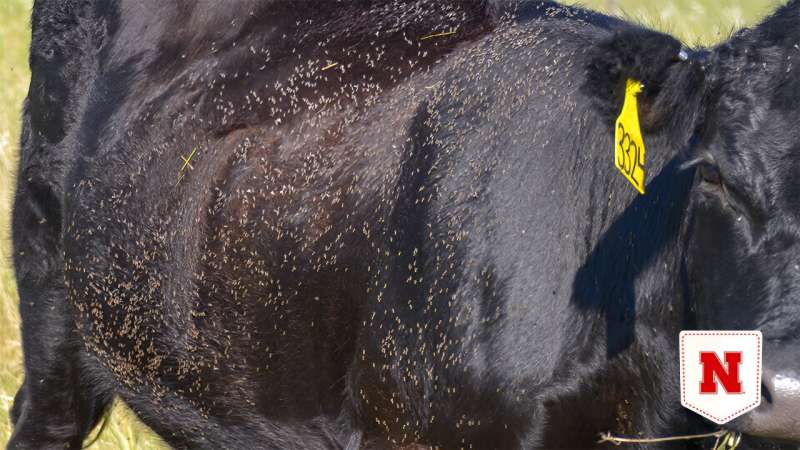This article has been reviewed according to Science X's editorial process and policies. Editors have highlighted the following attributes while ensuring the content's credibility:
fact-checked
peer-reviewed publication
trusted source
proofread
Study identifies organic alternative for fighting cattle-pestering flies

When cattle are fighting flies in the summer, they gather in tight bunches, leading them to eat less while experiencing more stress and discomfort. Beef producers have limited options for controlling the flies that pester their cattle. Moreover, existing insecticides are losing their effectiveness as insects develop resistance to repeated use.
Dave Boxler, a Nebraska Extension entomologist at the West Central Research, Extension and Education Center, has worked with a company for 15 years to develop a new insecticide that is organic and doesn't affect honeybees or bumblebees. The insecticide is based on two fatty acids derived from palm oil.
The new insecticide shows promise for organic producers who currently don't have many effective, economical fly-control options and for conventional producers who want to use products that are safer for people, animals and the environment.
In field trials, where cattle walked through an automatic sprayer that misted them with the insecticide, Boxler and his team found that the flies swerved away from animals that had been treated, as expected. However, they were surprised to find that the spray also killed the target flies on contact, an added benefit.
The paper is published in the journal Pest Management Science.
Boxler's team previously helped develop a version of the insecticide that has been approved by the Environmental Protection Agency for use on horses. That insecticide, called EcoVet, is commercially available nationwide.
The researchers are now waiting on EPA approval for the cattle-specific version. Boxler plans to continue studies next summer, when the team will test how much it can lower concentrations and achieve the same effectiveness.
More information: Alexander T. Lehmann et al, A push–pull strategy to suppress stable fly (Diptera: Muscidae) attacks on pasture cattle via a coconut oil fatty acid repellent formulation and traps with m‐cresol lures, Pest Management Science (2023). DOI: 10.1002/ps.7480
Journal information: Pest Management Science
Provided by University of Nebraska-Lincoln





















